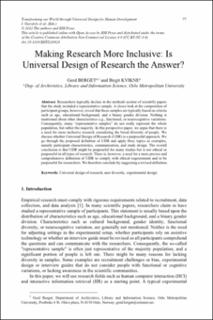| dc.contributor.author | Berget, Gerd | |
| dc.contributor.author | Kvikne, Birgit | |
| dc.date.accessioned | 2022-12-21T09:55:50Z | |
| dc.date.available | 2022-12-21T09:55:50Z | |
| dc.date.created | 2022-10-13T13:31:48Z | |
| dc.date.issued | 2022 | |
| dc.identifier.isbn | 978-1-64368-305-8 | |
| dc.identifier.isbn | 978-1-64368-304-1 | |
| dc.identifier.uri | https://hdl.handle.net/11250/3038980 | |
| dc.description.abstract | Researchers typically declare in the methods section of scientific papers that the study included a representative sample. A closer look at the composition of participant groups, however, reveal that these samples are typically based on criteria such as age, educational background, and a binary gender division. Nothing is mentioned about other characteristics e.g., functional, or neurocognitive variations. Consequently, many “representative samples” do not really represent the whole population, but rather the majority. In this perspective paper, we argue that there is a need for more inclusive research considering the broad diversity of people. We discuss whether Universal Design of Research (UDR) is a purposeful approach. We go through the proposed definition of UDR and apply three topics as examples, namely participant characteristics, communication, and study design. The overall conclusion is that UDR might be purposeful for many studies but is not ethical or purposeful in all types of research. There is, however, a need for a more precise and comprehensive definition of UDR to comply with ethical requirements and to be purposeful for researchers. We therefore conclude by suggesting a revised definition. | en_US |
| dc.language.iso | eng | en_US |
| dc.publisher | IOS Press | en_US |
| dc.relation.ispartof | Transforming our World through Universal Design for Human Development - Proceedings of the Sixth International Conference on Universal Design (UD2022) | |
| dc.rights | Navngivelse-Ikkekommersiell 4.0 Internasjonal | * |
| dc.rights.uri | http://creativecommons.org/licenses/by-nc/4.0/deed.no | * |
| dc.subject | Universal design of research | en_US |
| dc.subject | User diversity | en_US |
| dc.subject | Experimental design | en_US |
| dc.title | Making research more inclusive: Is universal design of research the answer? | en_US |
| dc.type | Chapter | en_US |
| dc.type | Peer reviewed | en_US |
| dc.description.version | publishedVersion | en_US |
| dc.rights.holder | © 2022 The authors and IOS Press | en_US |
| cristin.ispublished | true | |
| cristin.fulltext | original | |
| cristin.qualitycode | 1 | |
| dc.identifier.doi | https://doi.org/10.3233/SHTI220823 | |
| dc.identifier.cristin | 2061166 | |
| dc.source.pagenumber | 77-84 | en_US |

